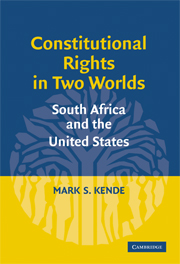7 - Freedom of Expression
Published online by Cambridge University Press: 25 July 2009
Summary
The First Amendment to the U.S. Constitution is heralded domestically and abroad for protecting freedom of speech and thus promoting democracy, individual self-realization, and the search for truth. This assessment is well justified especially when the United States is compared to authoritarian regimes. One scholar, however, describes the U.S. Supreme Court's First Amendment doctrine as “arbitrary and unpersuasive.” Another writes that it “resemb[les] the Ptolemaic system of astronomy in its last days.”
In particular, the Court has divided speech into “protected” and “unprotected” categories. The Court maintains that laws restricting protected expression, based on the speech's content, must be viewed with great skepticism. Yet, the Court has actually ignored content discrimination in some cases. It has instead used a relaxed scrutiny level and then concluded that the speaker's interest is outweighed by the state's interest. The Court has also on other occasions ignored its usual categorical speech divisions.
In this chapter, I recommend that the U.S. Supreme Court stop the formalism and the inconsistencies. Actually, I go a step farther and argue that the Supreme Court should borrow a page from the way foreign courts, such as the South African Constitutional Court, have explicitly weighed interests and values while also being minimalist when possible.
- Type
- Chapter
- Information
- Constitutional Rights in Two WorldsSouth Africa and the United States, pp. 183 - 213Publisher: Cambridge University PressPrint publication year: 2009



